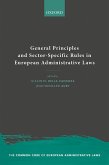This book argues that the development of administrative law in Europe owes much to Austria, not only because its Administrative Court was one of the first to define and refine general principles, such as legality, due process and general interest, but also because in 1925 Austria adopted a general law of administrative procedure, which had important consequences for other legal systems. The book follows two themes. The first is the Austrian codification of administrative procedure itself. The second is the spread of Austrian ideas and institutions to some neighbouring countries. From the first point of view, the book points out the various factors that favoured the adoption of administrative procedure legislation and the reception of the model of review. In this respect, the book is enriched by the English translation of the Austrian general act of 1925. From the other viewpoint, the book deviates from the standard accounts whereby the Austrian codification had some influence on its closest neighbours, including Poland, Czechoslovakia and Yugoslavia; first, because it compares their legislative provisions, as well as their durability, notwithstanding drastic political changes, when these countries fell under Soviet rule; second, because it does not limit itself to the concept of 'influence', arguing that there was a 'diffusion' of general administrative procedure legislation; thirdly, because it examines why the major administrative systems of continental Europe, such as France, Germany and Italy, did not adopt administrative procedure legislation. The book thus provides an unprecedented outlook on the emergence of an increasing common core regarding administrative procedure.
Dieser Download kann aus rechtlichen Gründen nur mit Rechnungsadresse in A, B, BG, CY, CZ, D, DK, EW, E, FIN, F, GR, HR, H, IRL, I, LT, L, LR, M, NL, PL, P, R, S, SLO, SK ausgeliefert werden.









